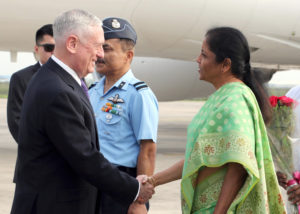New Delhi intends to convey to Washington that it will keep its own relations with Tehran and Moscow in place when US Secretary of State Mike Pompeo and Secretary of Defense Jim Mattis come to India this week for intense discussions under what is called the 2+2 format with their counterparts External Affairs Minister Sushma Swaraj and Defence Minister Nirmala Sitharaman.
The new dialogue will be the highest-level engagement between India and the US this year and replaces the ‘Strategic and Commercial Dialogue’ between the foreign and commerce ministers of both countries that was held during the previous administration of Barack Obama. For the Indian government, it is among the most significant engagements of the year, on par with the “informal summits” at Wuhan and Sochi, with the Chinese and Russian leadership.
The 2+2 also aims to insulate the India-US strategic relationship from feuds over trade and deep divisions on economic integration policies. Washington is particularly peeved at high non-tariff barriers New Delhi has imposed on items including aluminium. India’s trade surplus with the US, a major grouse with US President Donald Trump, is down nearly 5 percent, with India raising imports from the US, including oil and gas worth US$2.5 billion over the last year.
The blueprint for the 2+2 dialogue envisions “strengthening strategic, security and defence cooperation” between the two countries. The 2+2 helps to bridge the cross-cutting gap on security issues, along with the Homeland Security and the Counter-terrorism Designations Dialogue and is an effort to build the “whole of government” approach, strongly advocated by the Indian government in its relationships with all its major partners.
The bilateral component of the 2+2 comprises closer cooperation against terrorism and enhanced defence collaboration, including finalisation and may be signing the Communications Compatibility and Security Agreement (COMCASA), a key enabling instrument for collaboration in defence hardware manufacture, while the regional component includes closer coordination on Afghanistan and growing convergences on the Indo-Pacific and also in West Asia.
US sanctions on Tehran, which kick in on November 4, will hurt India, which has a major relationship in the region with Iran. While the government claims it will decide its own course of action on dealings with Tehran and not be coerced by US disapproval, it will take a final call after seeing how the European Union and others tackle the issue. However, it is clear that New Delhi is looking at other options to source its crude oil, despite Tehran’s competitive pricing and some Indian refineries being designed to refine Iranian crude. India may acquiesce on cutting back on Iranian crude, but will pitch strongly to continue with work on the Chabahar port, which is strategically vital for India, as an alternative route for humanitarian aid to Afghanistan.
Since Mattis appears to have managed to secure a waiver for India from the Countering America’s Adversaries through Sanctions Act (CAATSA), and given India Strategic Trade Authorization 1 status, besides being a designated Major Defence Partner highlighted in the US President’s National Security Strategy, New Delhi is hopeful it will be able to go ahead with the S-400 ‘Triumf’ missile shield deal when Russian President Vladimir Putin comes in October. Given the amount of time any defence deal takes to come to fruition in India, Washington is unlikely at this stage to threaten major damage to its ties with New Delhi over this agreement.
Pompeo, who arrives in New Delhi from Islamabad, will share his assessment of the new Imran Khan administration’s commitment to countering terrorism, a day after the reported death in Afghanistan of Jalaluddin Haqqani, head of the terrorist group Haqqani network which has repeatedly attacked Indian assets in Afghanistan. New Delhi will need to tread cautiously to best leverage the growing chasm between the perceptions of Islamabad and Washington. The depth of the Pakistan – China relationship and its fallout on both India and the US will feature in the bilateral discussions Pompeo will hold with Swaraj.
The dialogue on September 6 will first feature intra-ministry bilaterals, between Pompeo and Swaraj and between Mattis and Sitharaman, before the four principals meet for the 2+2, accompanied by six senior officials each.
It is their convergences that the four principals will aim to highlight in the dialogue as they look to secure their global partnership, to provide a strong framework for stability in the emerging regional architecture of the Indo–Pacific, specifically as a bulwark against an aggressive China.
Courtesy: https://southasiamonitor.org/news/2-2-dialogue-will-strengthen-indo-us-convergences/sl/27968





